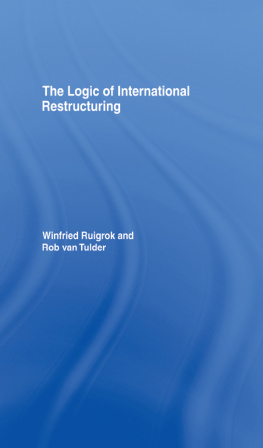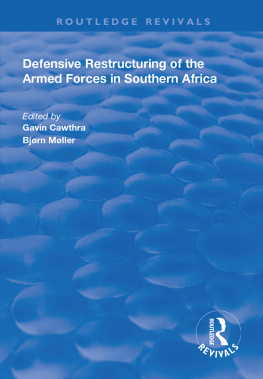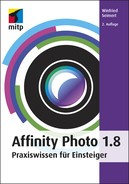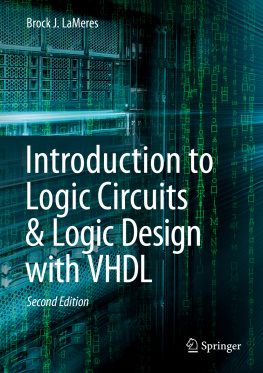The Logic of International Restructuring
The world economy faces an ongoing international restructuring race between industrial complexes. An industrial complex consists of a large core firm and its suppliers, workers, distributors, dealers, financiers and governments. The dynamism of the relationships between the core firm and these bargaining partners is seen as a major determinant of the international restructuring race.
In this book, Winfried Ruigrok and Rob van Tulder address many current debates on topics such as post-Fordism, globalisation and lean production. They also identify a number of rival internationalisation strategies that have been adopted by different companies. Moreover, they present an abundance of new as well as historical data on the worlds one hundred largest core companies. These data show that none of the largest core firms is truly global or borderless, and that virtually all of them in their history have benefited decisively from governmental trade or industrial policies.
The authors offer a highly interdisciplinary effort to link three previously isolated debates on industrial restructuring, globalisation and international trade policies. The Logic of International Restructuring is aimed at a wide academic, post-graduate and professional audience working in the areas of business, economics, organisational studies and international relations.
Dr Winfried Ruigrok and Dr Rob van Tulder are both working at the Rotterdam School of Management, Erasmus University, Rotterdam. Winifried Ruigrok has previously worked at the European Commission and is currently a visiting researcher at the University of Warwick. Rob van Tulder is also associated to the University of Amsterdam and is the coauthor of European Multinationals in Core Technologies (1988).
First published 1995
by Routledge
2 Park Square, Milton Park, Abingdon, Oxon, OX14 4RN
Simultaneously published in the USA and Canada
by Routledge
270 Madison Ave, New York NY 10016
Reprinted 1998
Transferred to Digital Printing 2007
1995 Winfried Ruigrok and Rob van Tulder
Typeset in Times by Datix International, Bungay, Suffolk
All rights reserved. No part of this book may be reprinted or reproduced or utilised in any form or by any electronic, mechanical, or other means, now known or hereafter invented, including photocopying and recording, or in any information storage or retrieval system, without permission in writing from the publishers.
British Library Cataloguing in Publication Data
A catalogue record for this book is available from the British Library
Library of Congress Cataloguing in Publication Data
A catalogue record for this book has been requested
ISBN 0415122384 (hbk)
ISBN 0415122392 (pbk)
ISBN 9781136163005 (ePub)
Publishers Note
The publisher has gone to great lengths to ensure the quality of this reprint butpoints out that some imperfections in the original may be apparent
This book originated from a fascination with international economic and political change, but at the same time from a worry about the weak analytical or even ideological basis of leading approaches to these transformations. In this book, we discuss a variety of approaches to international restructuring. We argue that many of these claims have been put forward on a very limited empirical basis, which makes it impossible to generalise the often fancy concepts to other cases. Authors who nevertheless choose to make such generalisations risk losing their academic credibility and embarking on an ideological venture.
It has been the aim of this study to contribute to an integrated and interdisciplinary framework to analyse the dynamics of International Political Economy. We cross disciplinary boundaries, trying to do justice to international complexity and to the variety of actors shaping this complexity. We have obtained elements from the debates on industrial restructuring, internationalisation of production and international trade and have integrated them into one analytical framework. This framework is to serve primarily as a qualitative tool with a heuristic function, to be supported by quantitative data. It builds on an eclectic presentation of approaches from disciplines such as international relations (systems approach, regime theory, dependency approach), economics (institutional economics, transaction cost approach, industrial organisation, economic geography, regulation school, Schumpetarian economics), business administration (resource dependency approach, strategic management) and approaches coming from political sciences and sociology (neo-corporatism, governmentbusiness relations, game and bargaining theory).
Our framework has its own deficiencies, and we are keenly aware of them. Initiating such an interdisciplinary approach involves certain risks, since it is almost impossible to master all their ins and outs. In spite of that, we have taken up the challenge, and hope we do not provide another case of intellectual overstretch. (In a follow-up study, we shall apply the framework to analyse international restructuring processes in the world car industry.)
This study like some of its forerunners has been supported financially by various organisations: the Forecasting and Assessment of Science and Technology (FAST/Monitor) programme of the Commission of the European Union, the Dutch Organisation for Scientific Research (NWO/ZWO), the Netherlands Organisation for Technology Assessment (NOTA), the Faculty of Political and Socio-Cultural Sciences (PSCW) of the University of Amsterdam, and the Rotterdam School of Management (RSM), Erasmus University Rotterdam.
Over the past years, a number of people have been a source of continuous support and inspiration. Observing our academic and personal struggles, Gerd Junne has never ceased to encourage us to finish this study. It is due to the interdisciplinary nature of his academic interests that we dared undertake such a broad endeavour in the first place. In 1983, Gerd Junne together with Annemieke Roobeek, Guido Ruivenkamp and one of the present authors initiated an interdisciplinary study project to investigate the international restructuring race (Junne, 1984a). This project has led to a number of studies. Annemieke Roobeek dealt with (amongst other things) the role of governments in a large number of OECD countries in the creation and diffusion of core technologies (Roobeek, 1987, 1990), Guido Ruivenkamp focused on the impact of biotechnology in the agro-industrial production chain (Ruivenkamp, 1989), while Rob van Tulder and Gerd Junne examined the strategies of multinationals in core technologies (1988). Looking back at the insights gained and the large number of stimulating discussions held over so many years, we regret that there are so many financial, organisational and personal obstacles to embarking on these kinds of interdisciplinary and longer-term studies.
Over the years, our students at the Rotterdam School of Management, as well as managers participating in executive programmes have been a source of stimulating and critical feedback to our approach. The present book has gained a lot from their insights. During the work on this particular study we have also profited from many direct contacts in industry and industry associations, in local organisations, in national governments, trade unions and in the Commission of the European Union, as well as from the help of good friends and colleagues at various universities. In random order, the following people have been very helpful: Philie Viehoff, Toru Nagatsuka, Peter van Ostaijen, Marc Ledoux, Takayoshi Amenomori, Peter van Bergeijk, Clara Eugenia Garcia, Ben Dankbaar, Kurt Hoffman, Michael Hobday, Kevin Morgan, Hans Krikke, Peter Unterweger, John Wilson, Arthur Karl, F. Saelens, Franoise Warrant, Manuel Santiago dos Santos, Jean-Michelle Corre, Riccardo Petrella, Werner Wobbe, Jean-Cristian Remond, Frans van den Bosch, Ash Amin, Dorien Flamand, Jan-Willem van Gelder, Hans Schenk, Leo van Eerden, Tetsumo Abo, John Zysman, Roger Tooze, John Dunning, Wout Buitelaar, Dany Jacobs, Peter Katzenstein, Robert Gilpin, Walter Zegveld, Wim Hulsink, and Jan Lambooy.












